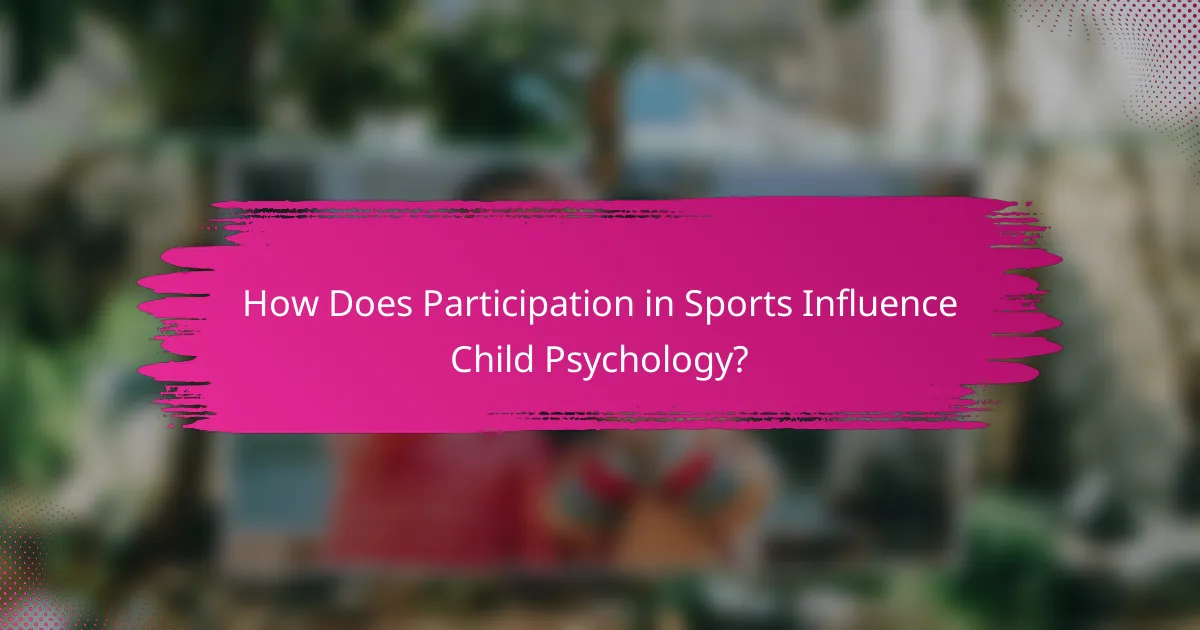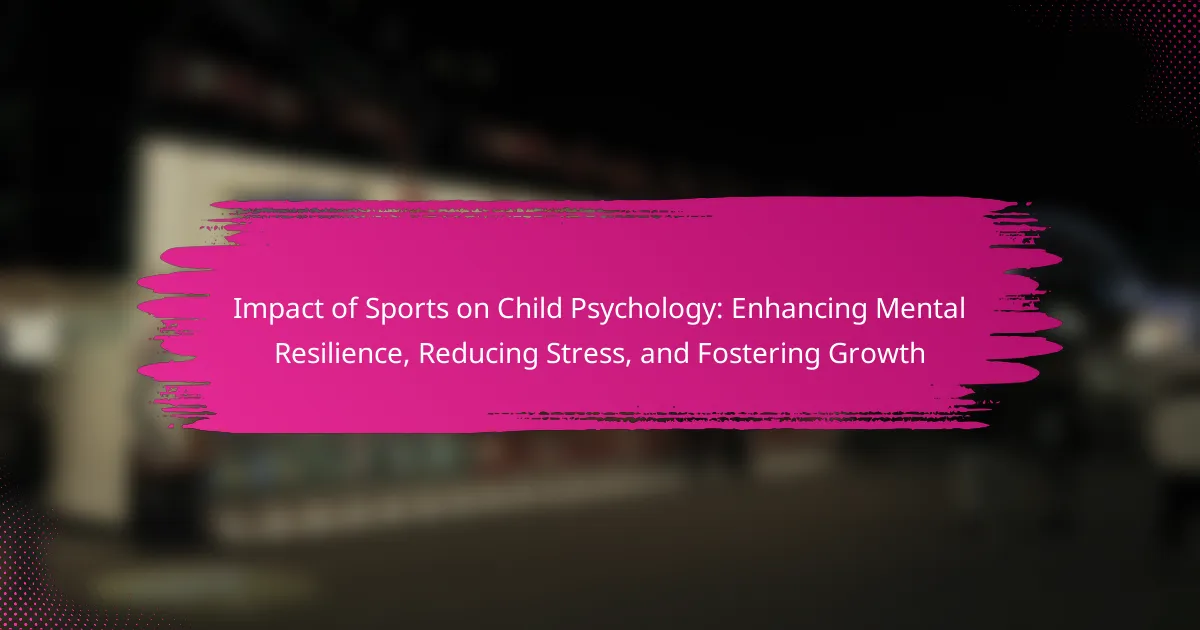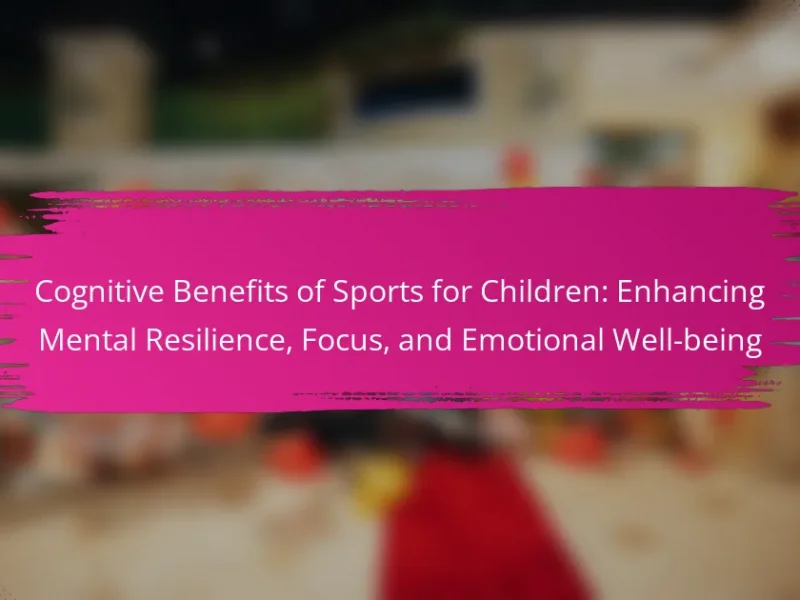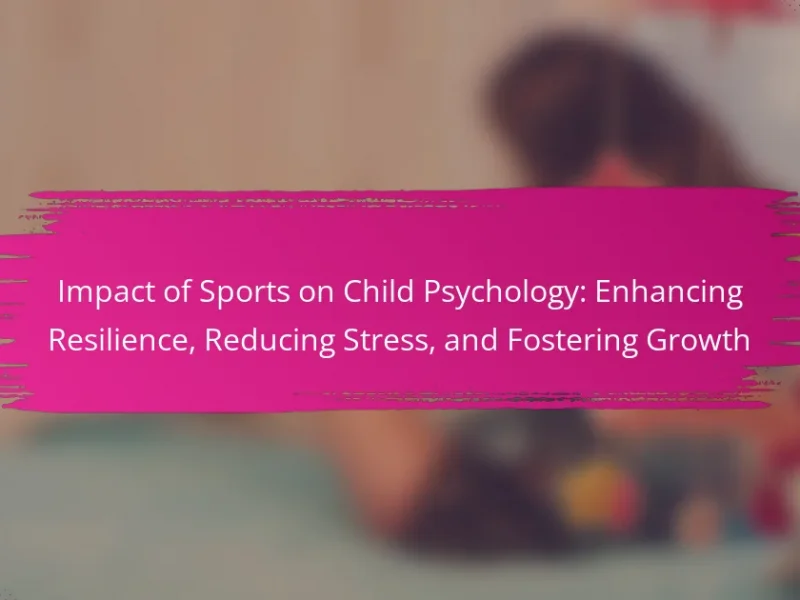Participation in sports significantly enhances child psychology by building mental resilience, reducing stress, and fostering personal growth. Engaging in physical activity helps children develop coping skills and promotes a positive self-image. Team sports teach collaboration and communication, essential for handling challenges. Overall, sports contribute to emotional health and well-being in children.

How Does Participation in Sports Influence Child Psychology?
Participation in sports significantly enhances child psychology by building mental resilience, reducing stress, and fostering personal growth. Engaging in sports helps children develop coping skills, promoting a positive self-image and emotional stability.
Physical activity releases endorphins, which alleviate stress and anxiety. Studies show that children involved in sports report lower levels of depression and higher self-esteem compared to those who are not active.
Team sports teach collaboration and communication, essential skills for personal and social development. This unique attribute of teamwork also enhances children’s ability to handle challenges and setbacks.
In summary, the impact of sports on child psychology is profound, contributing to emotional health and overall well-being.
What are the Psychological Benefits of Sports for Children?
Engaging in sports provides significant psychological benefits for children, enhancing mental resilience, reducing stress, and fostering personal growth. Sports participation promotes teamwork, which builds social skills and boosts self-esteem.
Physical activity releases endorphins, leading to improved mood and reduced anxiety. Children learn to cope with challenges, enhancing their problem-solving abilities and emotional regulation.
Regular involvement in sports encourages discipline and time management, skills that are transferable to academic settings. Additionally, children who play sports often develop a sense of belonging and identity, contributing positively to their overall mental health.
These psychological benefits underscore the importance of sports in child development, making it a vital component of a healthy lifestyle.
How Can Sports Enhance Mental Resilience in Young Athletes?
Engaging in sports significantly enhances mental resilience in young athletes. Participation fosters coping strategies, boosts self-esteem, and promotes teamwork.
Sports provide structured environments that teach young athletes to manage stress effectively. Research shows that athletes who face challenges in sports develop better problem-solving skills, which translates to real-life situations.
Moreover, physical activity releases endorphins, reducing anxiety and depression. A study indicates that regular participation in sports can lower stress levels by up to 30%.
Finally, sports instill a growth mindset. Young athletes learn to view failures as opportunities for growth, which is crucial for mental resilience. This mindset encourages perseverance and adaptability, vital traits in both sports and life.
What Strategies Foster Mental Toughness through Sports?
Participating in sports fosters mental toughness by promoting discipline, resilience, and teamwork. Engaging in competitive activities teaches children to cope with failure and manage stress effectively.
1. **Goal Setting**: Sports encourage setting and achieving personal goals, enhancing motivation and self-discipline.
2. **Stress Management**: Physical activity reduces stress hormones, leading to improved emotional regulation.
3. **Coping Strategies**: Athletes learn to handle pressure, developing strategies that can be applied in various life situations.
4. **Social Support**: Team dynamics create a support network, helping children build relationships and enhance their emotional well-being.
5. **Growth Mindset**: Sports instill a growth mindset, encouraging children to view challenges as opportunities for development.
These strategies collectively enhance mental resilience, equipping children with skills that extend beyond sports.
In What Ways Do Sports Help in Reducing Stress for Children?
Sports significantly reduce stress for children by providing physical activity, social interaction, and emotional expression. Engaging in sports releases endorphins, which enhance mood and alleviate anxiety. Physical exercise also improves sleep quality, contributing to better overall mental health. Furthermore, teamwork fosters social skills and resilience, helping children cope with stressors effectively. Regular participation in sports instills discipline and routine, which can further mitigate stress levels.
What Techniques Can Coaches Use to Manage Stress in Young Athletes?
Coaches can use various techniques to manage stress in young athletes, including mindfulness practices, structured routines, and open communication. Mindfulness techniques help athletes focus on the present, reducing anxiety. Structured routines provide predictability, which can alleviate stress. Open communication fosters trust, allowing athletes to express concerns and emotions. These approaches enhance mental resilience, supporting growth and performance.
What Unique Psychological Challenges Do Young Athletes Face?
Young athletes face unique psychological challenges, including pressure to perform, fear of failure, and identity issues. These factors can lead to anxiety, burnout, and decreased self-esteem. The competitive environment often exacerbates stress, impacting mental resilience. Support systems and balanced training can mitigate these effects, fostering healthy growth and development.
How Do Different Sports Impact Mental Development Differently?
Different sports impact mental development in unique ways, enhancing resilience, reducing stress, and fostering growth. Team sports, like soccer, promote social skills and teamwork, while individual sports, such as swimming, enhance self-discipline and focus. Research shows that children involved in sports experience lower anxiety levels and improved self-esteem.
Additionally, sports that require strategy, like basketball, stimulate cognitive development by encouraging quick decision-making. On the other hand, sports with a strong physical component, like gymnastics, improve emotional regulation through physical expression.
Ultimately, the specific benefits vary based on the sport’s nature and the child’s engagement level. Understanding these distinctions can guide parents and educators in selecting appropriate activities for mental development.
What Psychological Traits are Commonly Enhanced by Team Sports?
Team sports commonly enhance traits such as teamwork, communication, and resilience in children. These psychological benefits foster mental resilience, reduce stress, and encourage personal growth. Studies show that children involved in team sports often exhibit improved self-esteem and social skills. Participation in these activities provides a unique environment where children learn to collaborate and support one another, which is crucial for their overall psychological development.
What Psychological Traits are Commonly Enhanced by Individual Sports?
Individual sports commonly enhance psychological traits such as self-discipline, focus, and resilience. These traits contribute to improved mental resilience, reduced stress, and personal growth. For instance, self-discipline fosters consistent practice, while focus enhances performance under pressure. Resilience develops through overcoming challenges, leading to greater confidence and adaptability. Individual sports provide a unique environment for children to cultivate these essential psychological traits, promoting overall mental well-being.
What Rare Psychological Benefits Can Sports Provide for Children?
Sports provide rare psychological benefits for children, enhancing mental resilience and reducing stress. Engaging in team sports fosters social connections, promoting a sense of belonging. This social support can lead to improved self-esteem and emotional regulation. Furthermore, sports teach children how to cope with failure, building perseverance and adaptability. These experiences contribute to long-term mental growth, equipping children with skills to navigate life’s challenges effectively.
How Can Parents Support Their Child’s Mental Development through Sports?
Parents can significantly support their child’s mental development through sports by fostering resilience, reducing stress, and encouraging personal growth. Engaging in sports helps children build coping skills and enhances their ability to handle challenges. Regular physical activity releases endorphins, which reduce stress and improve mood. Additionally, team sports promote social skills and teamwork, contributing to emotional intelligence. Research indicates that children involved in sports exhibit higher self-esteem and better academic performance, highlighting the holistic benefits of athletic participation.
What Role Does Communication Play in Supporting Young Athletes?
Effective communication plays a crucial role in supporting young athletes by enhancing their mental resilience and reducing stress. Open dialogue between coaches, parents, and athletes fosters a supportive environment that encourages growth.
Clear communication helps athletes understand expectations and receive constructive feedback, which builds confidence. When young athletes express their thoughts and feelings, they develop emotional intelligence, enabling them to cope with challenges.
Additionally, supportive communication promotes teamwork and collaboration, essential for a positive sports experience. Athletes who feel heard and valued are more likely to engage fully and enjoy their activities.
In summary, effective communication is vital in nurturing the psychological well-being of young athletes, contributing to their overall development and success in sports.
What Best Practices Can Coaches Implement to Promote Positive Mental Health?
Coaches can implement several best practices to promote positive mental health in young athletes. Fostering an inclusive environment encourages open communication, allowing children to express their feelings and concerns. Regular mental health check-ins help identify stressors and provide necessary support. Incorporating mindfulness techniques, such as breathing exercises or visualization, enhances mental resilience. Celebrating individual and team achievements reinforces self-esteem and motivation, fostering overall growth. Encouraging a balanced approach to competition reduces pressure and promotes enjoyment in sports.
What Common Mistakes Should Parents Avoid in Youth Sports?
Parents should avoid emphasizing winning over skill development. This focus can lead to anxiety and burnout in young athletes. Instead, prioritize enjoyment and personal growth.
Another mistake is over-scheduling. Allowing children time for rest and other interests fosters well-rounded development. A balanced schedule enhances mental resilience and reduces stress.
Neglecting communication is also common. Open discussions about feelings and experiences in sports help children process their emotions and build confidence.
Finally, avoid comparing children to peers. Each child develops at their own pace, and comparisons can diminish self-esteem. Encourage individual progress to promote a positive sporting experience.
How Can Children Balance Sports and Academic Pressures Effectively?
Children can effectively balance sports and academic pressures by developing time management skills and prioritizing mental health. Engaging in sports enhances mental resilience, which helps children cope with stress. Sports participation fosters a sense of achievement and boosts self-esteem, contributing positively to academic performance.
Research shows that children involved in sports have lower anxiety levels and improved focus. For instance, a study found that regular physical activity can enhance cognitive functions and memory retention in students. This dual engagement in sports and academics can create a well-rounded development environment.
Encouraging children to set realistic goals in both areas can prevent overwhelm. Parents and coaches should support open communication about challenges faced, ensuring children feel supported in managing their commitments. Balancing these pressures ultimately leads to personal growth and a healthier mindset.
What Expert Insights Can Guide Parents and Coaches in Supporting Young Athletes?
Expert insights emphasize the importance of fostering mental resilience in young athletes. Coaches and parents should focus on creating a supportive environment that encourages growth and reduces stress.
Recognizing the psychological benefits of sports is crucial. Engaging in physical activity enhances self-esteem and promotes social skills. This can lead to better emotional regulation and coping strategies.
Establishing open communication is essential. Parents and coaches should regularly check in with young athletes about their feelings and experiences. This practice helps identify stressors and provides opportunities for guidance.
Encouraging a balanced approach to competition can mitigate pressure. Emphasizing personal improvement over winning fosters a healthier mindset and nurtures long-term passion for sports.


